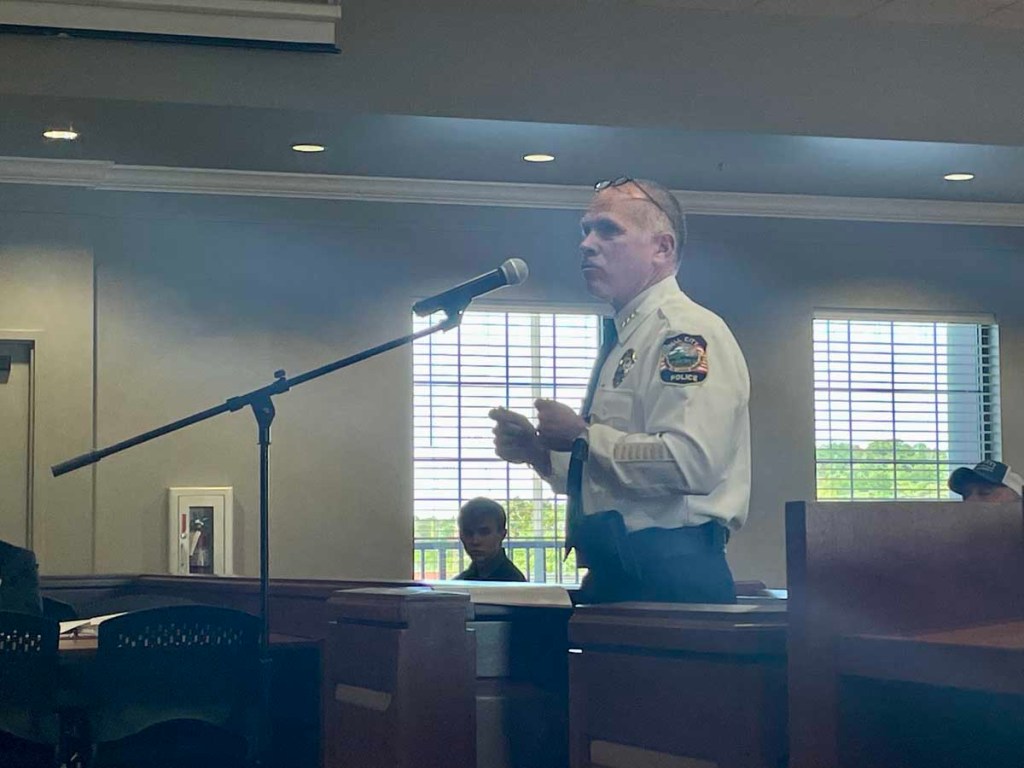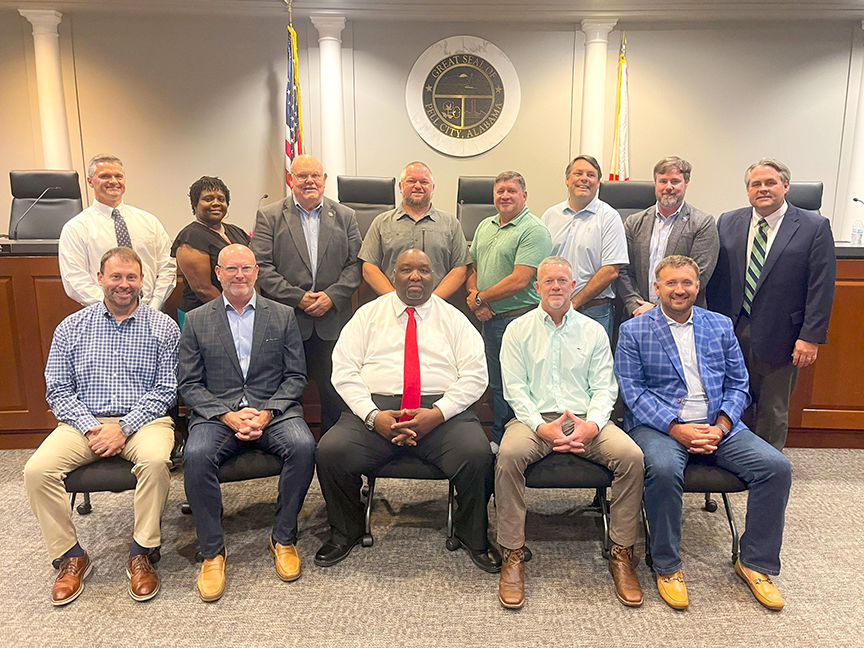State can now authorize wiretapping for Alabama law enforcement
Published 12:00 am Thursday, February 9, 2023

- Police Chief Clay Morris approaches the city council in April to ask for updated equipment in vehicles. File photo.
MONTGOMERY — A new law allowing Alabama law enforcement agencies to use wiretapping is now in effect and aims to increase the safety of law enforcement in the line of duty.
State and local agencies will only be able to apply for interception for instances related to drug investigations.
The Bill Clardy III Act (HB 17) will allow a law enforcement officer (who has received training on the legal and technical aspects of the interception and use of wire or electronic communications) to apply for an intercept order through the secretary of the the Alabama State Law Enforcement Agency. Prior to the new law, law enforcement agencies would have to parter with the FBI for investigations requiring wiretapping.
“It’s a very effective tool for eradicating a drug trafficking organization, really what I used to call from the root to the stem,” said Pell City Police Chief Clay Morris. “You can get everyone from the the local trafficker that’s standing on your street corner selling drugs causing a nuisance to your communities, as well as their next level source or the middle of a source of supply for them. and ultimately, you’d like to work that investigation to find the wholesale source of supply that is not only supplying your drug traffickers in your areas, but also other drug traps around the state of Alabama.”
If the ALEA secretary approves the request, the secretary can submit a written request to the state attorney general’s office to apply for an intercept order though a local judge of jurisdiction. With the state capabilities of using the technology, it could likely provide more expediency to jurisdictions where wire tapping services will be requested.
Cullman County Sheriff Matt Gentry recalled his time at the DEA in Birmingham where he was part of large scale multi-state investigations. Wiretapping wasn’t always easy to obtain, he said.
“It took months and months of investigations, documentation, reports, affidavits to obtain one,” Gentry said. “Once they were signed you started the process of conducting a wiretap, but just the wiretap itself is not enough for a conviction. You have to have other corroborating evidence surveillance, traffic stops, cooperating witnesses, etc. So it’s not just that one element that gets a conviction.”
The Bill Clardy III Act is named after a former Huntsville Police Department officer who was killed during an undercover drug operation in 2019. During that operation, officers were meeting up with the suspect to purchase drugs.
Morris, a former Drug Enforcement Agent of more than 20 years, said wire interception will allow for an added layer of safety due to real-time knowledge of drug activity and intent.
“If a drug trafficker is trying to set up an ambush, or trying to rip someone off for their drug money instead of actually selling them drugs, you’d be able to hear that in real time and be able to react to that immediately,” he said. “No technology is going to reduce every risk associated with drug trafficking and drug arrests and drug distribution; however, (wire intercepting) gives you great insight to what’s happening in real time, which in real time, intelligence and information is critical to any investigation.”
According to the bill, electronic communications could include fax signal or computer-generated signals, or encrypted signal transferred via wire, radio, electromagnetic, photoelectric or photo optical system from one party to another.
An investigative officer applying for the intercept order must include a statement of facts that justify the belief that an order should be issued before it is approved at the higher level, ultimately by a local judge.
Such facts should include, in part: details of the specific offense that has been committed, is being committed or will be committed; a statement that other investigative procedures have been attempted and failed, reasonably appear to be unlikely to succeed if attempted or are too dangerous to be attempted; details on involved parties; and, the time frame and where the communication will be intercepted.
“As with any interceptive communications, obviously it’s highly intrusive. So you have to have those mechanisms in place to ensure that there’s not abuse of that, and I think the state has done a good job and putting those in place,” said Morris, who worked for the DEA for more than two decades.
When an investigative officer, while engaged in intercepting wire or electronic communications, intercepts communications relating to a crime other than those specified in the intercept order, the contents can be used as evidence in the unrelated case.
“The contents of, and any evidence derived from the communication may be used … when a judge of competent jurisdiction finds, on a subsequent application, that the contents were otherwise intercepted in accordance with this chapter. The subsequent application shall be made as soon as practicable,” the law states.
The law provides provisions for an individual whose wire or electronic communication is intercepted, disclosed or used in violation of the law to bring civil cause of action against any individual who intercepts, discloses, or uses or procures another individual to intercept, disclose or use the communication.
Annual data reporting is required on wire interception used by law enforcement to include information on the frequency and number of communication intercepted, nature, cost of manpower/resources, number of arrests and trials resulting, number of grants/denials of motions to suppress, convictions from intercepts.
Gentry noted one challenge to successful convictions from wiretapping is proof that the person of interest was in possession of and using that device when a recording took place.
Several states in the United State have converted to wiretapping authorization on the state level and have taken on some of the costs to implement and operate the service.
In 2002, Georgia lawmakers conferred the power to issue wiretap warrants to judges of jurisdiction as part of its Support the War on Terrorism Act of 2002.
According to DrugPolicyFacts.org, the average cost of an intercept in 2019 was $75,160. The most expensive state wiretap was in Georgia, where costs for a 178-day wiretap conducted to investigate an offense in the narcotics category resulted in 17 arrests and 1 conviction, totaled more than $1.9 million, according to Drug Policy Facts.
Reporter Patrick Camp of The (Ala.) Cullman Times contributed to this report.



